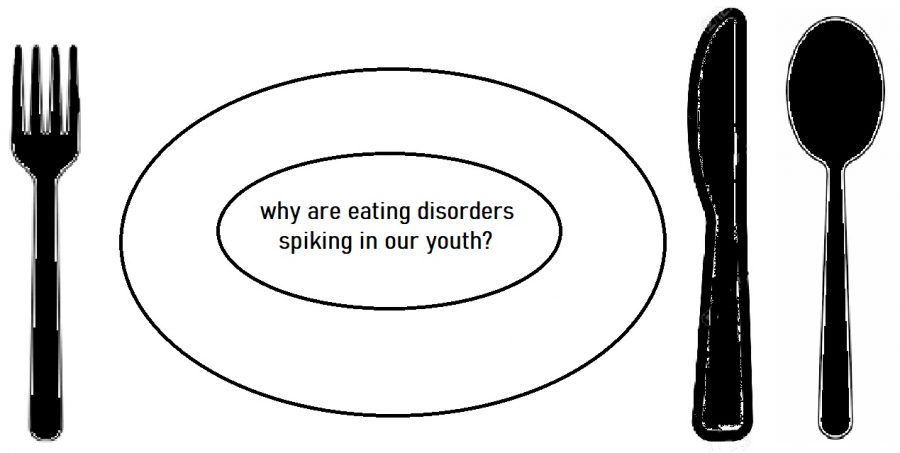Eating Disorders in Teens Have ‘Exploded’ in the Pandemic
Contrary to popular belief, eating disorders are not always about food. In fact, they are a mental illness usually developed to cope with something eventful or traumatic in someone’s life.
May 7, 2021
There has definitely been some huge changes since the start of the pandemic, especially in the everyday lives of students. Things like physical and mental health have been heavily impacted. This includes influences from social media, big changes in surroundings, and impact from needing stability.
To really understand why this spike came to be, we have to take in the fact that eating disorders are a mental illness that is usually developed as a coping mechanism. All of a sudden, kids are moving from a structured and monitored environment to having almost no contact with anyone other than through multiple electronic devices. Things like anxiety, fear, and the loss of control are bound to impact kids.
According to psychologist Erin Accurso, the clinical director of the eating disorders program at the University of California, San Francisco, “Our inpatient unit has exploded in the past year,” taking in more than twice as many adolescent patients as it did before the pandemic. The National Eating Disorders Association helpline has had a 40 percent jump in overall call volume since March 2020. The clinical units that are made to help those with eating disorders have been overfilled during the pandemic, and there are some speculations as to why.
There are several possible explanations for this increase in eating concerns in teenagers. Teenagers have lost their balance and structure of everyday life. This change can spark uncertainty. They have also lost the social contact and support of their friends which makes ‘fitting in’ even harder.
A typical trait attached to eating disorders is the sentiment of overachievement. Normally, most of the youth’s energy was poured into their academic, athletic, or extracurricular pursuits. Suddenly, they had too much time on their hands and, “Some kids turned their attention toward physical health or appearance as a way to cope with anxiety or feel productive,” Dr. Accurso said. “Their goals around ‘healthy’ eating or getting ‘in shape’ got out of hand.” This quickly caused significant weight fluctuation.
There is also an issue with emotional eating. Teenagers were looking for a coping mechanism after change and instability. With too much time and easy access to food, emotional eating was almost unavoidable. “Being at school presents a barrier to using food as a coping mechanism; at home, we don’t have that barrier,” noted Kelly Bhatnagar, psychologist and co-founder of the Center for Emotional Wellness in Beachwood, Ohio.
The issue of food insecurity has also come into play. Research shows that teenagers in homes where food is scarce are more likely to fast, skip meals, and abuse laxatives and diuretics with the aim of controlling their weight.
What teens see on their screens is also a factor. During the pandemic, teenagers have spent more time than usual on social media. Viewing the internet isn’t a problem at all, and in fact, helps teenagers stay in touch with the outside world. However, a lot of media on the internet can impact a child’s mental health. Seeing models and ‘perfect’ people constantly is bound to cause doubts in an impressionable mind.
Dr. Austin noted that teenagers can be prone to comparing their own bodies to the images they see online. “That comparison creates a downward spiral in terms of body image and self-esteem. It makes them more likely to adopt unhealthy weight control behaviors.”
At first, it doesn’t start off with malicious or wrong intent. However, when these adolescents go searching for healthy ways to manage their weight, the results aren’t always as linear. There is a lot of harmful content on the everyday platforms that we use (such as Instagram and TikTok). They can come across highly edited or misleading information that might discourage them. A lot of social media is fake, and unfortunately, on some media platforms, disordered eating is encouraged. It can be hard to identify whether a certain post is harmful or not, especially since we see so many advertisements encouraging weight loss daily.
Anyone can be affected. Eating disorders don’t have an age or gender limit at all. In fact, children as young as 7-9 years old and adults 40+ can develop an eating disorder.
Eating disorders are the number one fatal mental illness and can be detrimental to the person’s health. They often go untreated due to the normalization of diet culture and societal standards. It is difficult, but keeping an eye out for loved ones is really all we can do. Make sure to keep track of any sudden changes in the behavior of the people around you, especially when it comes to mealtimes.

















